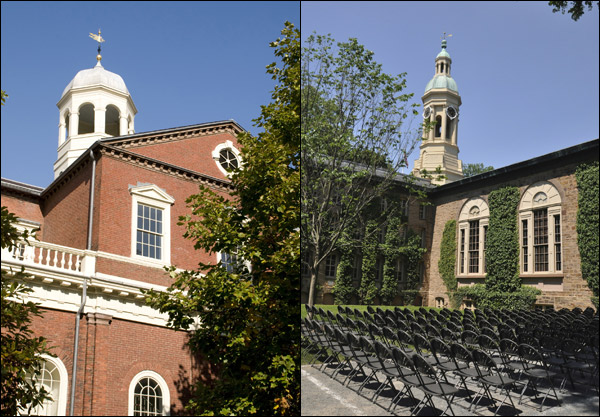2010 Muzzle Awards on campus
Harvard and Yale once again lead the way . . . for academic censorship
By HARVEY SILVERGLATE | June 30, 2010 Harvard and Yale universities felt the sting of the global economic collapse firsthand in 2009, as the endowments of these stalwart New England Ivy League members dropped by
nearly a third. The schools didn't fare much better in the free marketplace of ideas, either. Since last summer, both Ivies have helped pave the censorial frontiers of the corporatized academy, while employing public-relations armies to perpetuate the aura of the liberal-arts sensibility. For these efforts, described in more detail below, two of the nation's pre-eminent academic institutions have earned Muzzle Awards, accolades unlikely to be trumpeted by their respective Offices of Public Affairs.
HARVARD UNIVERSITY
Harvard, a private institution, is not bound by the First Amendment guarantee of free expression. But Harvard's own
Free Speech Guidelines promise wide latitude for self-expression, because "[c]urtailment of free speech undercuts the intellectual freedom that defines our purpose." In at least four instances over the last year, however, Harvard's actions spoke louder than words.
1. Med School media muzzle A proposed Harvard Medical School policy for 2009–'10 instructed "all interactions between students and the media" to be coordinated with the school's public-relations office. The policy was reportedly influenced by student comments in a New York Timesexposé of conflicts of interest among Med School professors. When students were notified about the new policy last August, the incensed aspiring MDs naturally contacted the Times. Under the Times' spotlight, Med School administrators admitted the wording was "problematic" and vowed to remove the policy from the student handbook.
2. Law School soft censorship A third-year Harvard Law student, in a November e-mail to a friend, expressed her interest in seeing further research on a controversial question: whether race and intelligence might be genetically linked. Though the 3L stressed that she "would just like some scientific data to disprove the genetic position," she deemed the available data insufficient for certainty.
When said e-mail surfaced in late April on a self-described "legal tabloid" blog, Harvard Law Dean Martha Minow sent a school-wide response, in which she not only misinterpreted the student's intent, but condemned the mere asking of the 3L's questions. This skeptical student's "false view," Minow wrote in her accusatory e-mail, "suggested that black people are genetically inferior to white people."
Read closely, the student's e-mail makes no such suggestion. In Minow's response, however, you'll find a textbook example of soft censorship — no direct penalty, but a declaration that certain ideas (or even questions) are off-limits. Minow was "heartened" by the 3L's acknowledging "the offense and hurt that the comment engendered." How would Minow have responded had the student stood by her inquiry? Soft, or hard punishment?
3. Employee loyalty oath It's not only student speech that is under scrutiny. Harvard employees were required, this past year, to sign a stringent "confidentiality agreement," a ban on disclosure of "information about a person or an entity that, if disclosed, could . . . be damaging to financing standing, employability, reputation or other interests [emphasis added]." This serves to insulate not only Harvard, but also its administrators, from public criticism. "Other interests," of course, are in the eyes of the beholder. And few employees would risk venturing to find out what they might be.
4. The inmates take over the asylum Given the Muzzle-friendly campus milieu, it's small wonder that students even turned the cudgel of censorship onto themselves. Radical anti-immigration activist (and Minuteman Project founder) Jim Gilchrist was invited to speak at an October 17 Harvard symposium. Days before the event, notwithstanding that Gilchrist had spoken at Harvard Law less than a year prior, the Harvard Undergraduate Legal Committee rescinded the invitation. Justifying his censorial urges, a student expressed concern "about the broader national implications of legitimizing these extremist views with the Harvard name." These undergrads had clearly drunk Harvard's corporatized Kool-Aid.
